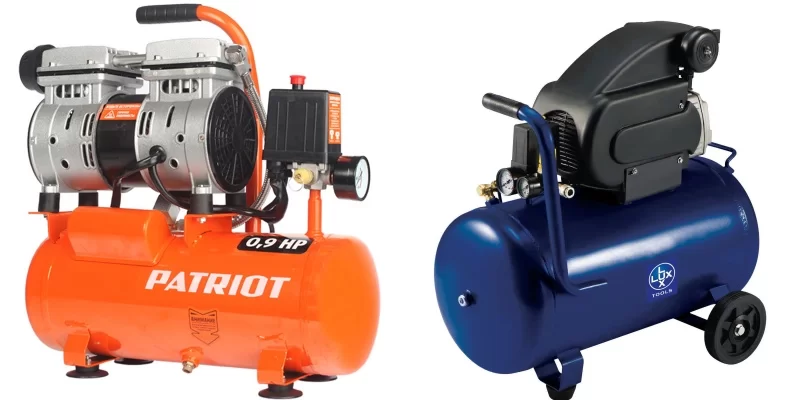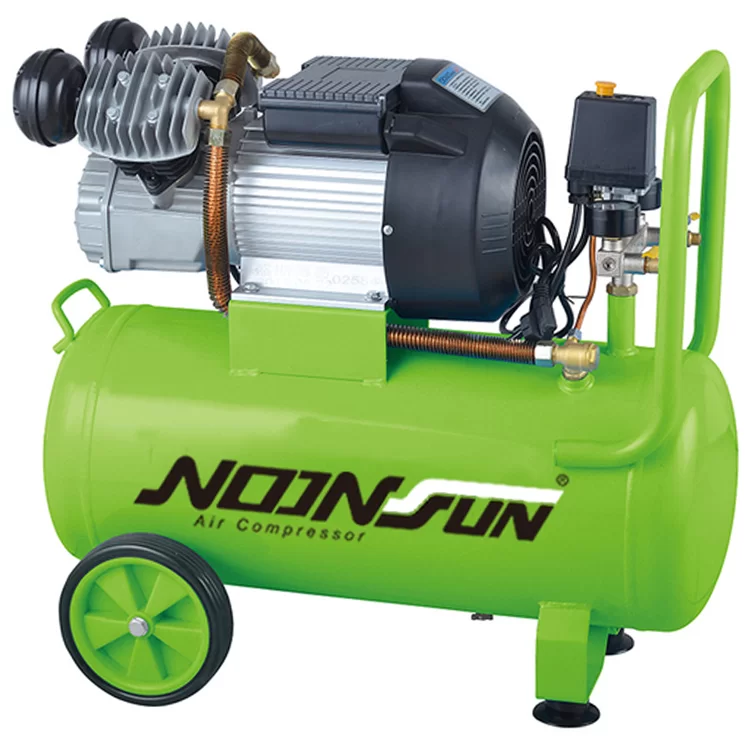
Compare oil and oil-free compressor
The compressor is an important device when it comes to moving and compressing gases. Piston compressors have no equal in this matter. Manufacturers offer a wide variety of models of such units. Until recently, the market leaders were traditional oil, but a new competitor has appeared — units that do not require cylinder lubrication. Which option is better and what is the difference between them? Our experts figured it out.

Features and principle of operation of the unit
The first prototypes of a compressor based on a piston were created a couple of centuries ago and until the beginning of the 20th century, such devices were the only ones used in metallurgy to supply air compressed under pressure. The working part of a reciprocating compressor is a cylinder with two valves in its walls — discharge and suction.
When pressure drops between the compressor cylinder and its chambers, the valves automatically open. The movement of the piston begins, entraining air, which is pumped until the desired gas pressure is reached, entering the receiver (storage tank).
The design of the device provides for the presence of a pipeline with filters. If we are talking about a unit of significant performance, its cylinders are equipped with water cooling. For low power devices, air cooling is sufficient.
Regardless of the performance and drive of a reciprocating compressor, the main principle of its operation is the compression of gas in a cylinder. To achieve the desired effect, a significant portion of the power is used to reduce friction from the piston and cylinder. To reduce the negative effect, the piston moves in such a way that there is no contact with the cylinder walls, and the gap is filled with sealing rings.
Advantages and disadvantages of compressor units
Oil compressors
Oil compressors are a reliable and time-tested device that allows you to carry out long and complex work of various directions.
Advantages
- Economical power consumption;
- High performance;
-
Long working cycle;
-
No overheating;
-
Long service life.
Flaws
-
The need to control the oil level;
-
Significant weight;
-
High price.
Oil-free compressors
Advantages
-
Supply of clean air;
-
Convenient operation (due to the lack of the need to use oil);
-
Minor weight;
-
Low price.
Flaws
-
Low performance;
-
Short service life;
-
Weak power.
Main differences

Depending on the characteristics of the seals, compressors are lubricated (oil) and without it (oil-free). Consider their main features and differences.
In design
The design of the oil-type compressor uses an oil supply system (pipes, lubricator, pump). Additionally, it is also complicated by the presence of several holes on the walls of the cylinder and its cover. Due to the presence of lubrication, friction between the oil system rings and the cylinder walls is reduced to a minimum. The piston is additionally mounted with split oil scraper rings with grooves for removing grease.
Oil-free compressors have 2 types of rings on the piston. Sealings prevent gas leakage, guides do not allow the piston to come into contact with the walls of the cylinder. Rings are made of polymer compositions, graphite compounds, photoroplastic.
ON A NOTE. The rings of oil-free compressors are non-contact, so wear occurs very quickly. Due to the reduced resource of such rings, the operating cycle of the product at high pressure is no more than 200 hours.
In appointment
Conventionally, compressors can be divided into three large groups: industrial (the most powerful, respectively), semi-industrial (up to 1000 l / min) and household. The latter are self-contained devices for air supply to refrigerators, small installations, pneumatic tools, etc. The choice of a suitable model in this case depends solely on personal preferences, the type and scope of work. Oil-free — the best option for short-term work, oil — for long-term.
There are a couple of supporting criteria to consider when choosing the right industrial compressor:
-
Type of gas — oil-type compressors should be chosen very carefully, since with some types of gas the lubricant can enter into an uncontrolled reaction and an explosion will occur;
-
Frequency of service — it is better to choose units with a significant operational resource.
In operation
In the process of using the compressor with lubrication, its level must be constantly monitored with periodic addition of the required amount and oil change. Moreover, special brands are recommended for use. If we are talking about portable (mobile) models of compressors, they must be kept strictly in a horizontal position (otherwise it is fraught with spilling oil from the tank).
Oil-free compressors do not have the same problems as units with an oil system, but at the same time, such devices require regular replacement of piston rings. As for the other actions related to the maintenance of compressors (cleaning filters, checking equipment, etc.), everything here is identical, regardless of the type of unit.
How to choose the right compressor?
In order for the purchased product to please not only with its appearance, but also to perform the necessary task as efficiently as possible, you should choose the unit very carefully. We recommend using useful tips and the purchase will certainly be successful:
-
An oil-free compressor is better suited for short-term, low-pressure pneumatic work;
-
To perform work in the pharmaceutical, food industry, the oil-free option is optimal, again;
-
For construction work, as well as in industrial conditions, there is no better option than an oil compressor. Despite the rather high cost, it will fully justify it in this case.
Добавить комментарий
Для отправки комментария вам необходимо авторизоваться.